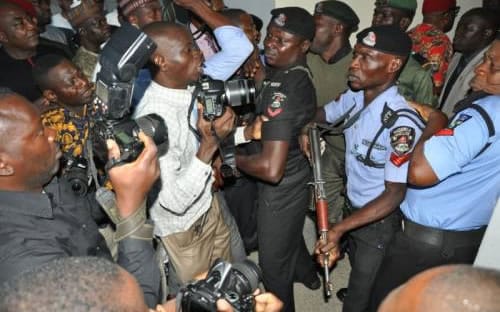Press Freedom: Nigeria ranks 112th on 2024 World index

The 2024 World Press Freedom Index by Reporters Without Borders (RSF) has listed Nigeria among the most challenging countries for journalists in West Africa.
Nigeria is ranked 112th position out of 180 countries, an improvement from the 123rd rank in 2023. According to the report, Nigerian journalists are regularly monitored, attacked, and arbitrarily arrested.
The index evaluated political, legislative, economic, social, and security factors. RSF noted a high level of government interference in Nigerian media, with increased pressure during elections. Media ownership influences the neutrality of political coverage, and government officials influence media personnel appointments.
“The level of governmental interference in the news media is significant. It can involve pressure, harassment of journalists and media outlets, and even censorship. This interference is even stronger during electoral campaigns. Addressing political issues in a balanced way can also be difficult depending on the media outlet’s owner.
“To a large extent, government officials have a say in the appointment and dismissal of media officials, whether in the public or private sector. The authorities also make arbitrary decisions, such as the destruction in September 2023 of two private media transmitters in the southeast of the country,” RSF noted.
Adding that “In May 2023, a federal high court suspended a decision of the National Broadcasting Commission (NBC), the broadcasting regulator, to suspend around 50 radio stations for failing to pay their licence fees.”
Nigeria’s constitution guarantees freedom of expression, yet certain laws hinder journalistic activities, including those on cybercrime, anti-terrorism, state secrets, and the penal code, the index stated.
“The constitution protects freedom of expression and opinion, but there are many laws whose provisions make it possible to obstruct the work of journalists, such as the laws on cybercrime, anti-terrorism and state secrets, and the penal code continues to treat defamation as a crime. Access to information remains very difficult,” it stated.
Economic conditions and low salaries in the media sector contribute to corruption. Media outlets also encounter violence related to religion, gender, or ethnicity.
“While there are many media outlets, very few are in good economic health. Significant salary delays make journalists vulnerable to corruption and cash for coverage. Like politicians, business people and companies that provide advertising revenue can have an influence on editorial content,” RSF stated.
RSF highlighted that Nigeria experiences a high rate of violent incidents against journalists, particularly during elections.
The February and March 2023 general elections saw attacks on nearly 20 journalists and media outlets.
In recent years, most of West Africa’s violent attacks, arbitrary detentions, and shooting deaths of journalists have taken place in Nigeria, according to RSF.
Crimes against journalists often remain unpunished, and there is a lack of protective mechanisms. Authorities maintain strict surveillance over journalists and sometimes issue threats.
“Even when the perpetrators are known or apprehended. There is almost no state mechanism for protection. In fact, the authorities keep journalists under close surveillance and do not hesitate to threaten them,” it stated.
